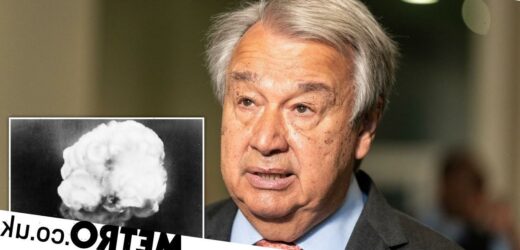We know there’s already a lot to worry about in the world, but unfortunately nuclear war needs to be nudged a bit higher on the list, according to the UN Secretary-general.
Antonio Guterres gave a dire warning today that ‘humanity is just one misunderstanding, one miscalculation, away from nuclear annihilation’.
He said that conflicts in the Middle East and Asia already saw the regions ‘edging towards catastrophe’.
Crises in Ukraine and the Korean peninsula were also dangerous points, he said.
He made the comments at the opening of a month-long conference to review the Nuclear Non-Proliferation Treaty.
Thee landmark agreement was signed over 50 years ago aimed at preventing the spread of nuclear weapons and eventually achieving a nuclear-free world.
Mr Guterres told ministers, officials and diplomats that the meeting is taking place ‘at a critical juncture for our collective peace and security’ and ‘at a time of nuclear danger not seen since the height of the Cold War’.
To view this video please enable JavaScript, and consider upgrading to a webbrowser thatsupports HTML5video
He said that the reason we had not seen nuclear disaster so far was mainly down to chance.
‘We have been extraordinary lucky so far,’ he said. ‘But luck is not a strategy.’
The conference is ‘an opportunity to hammer out the measures that will help avoid certain disaster, and to put humanity on a new path towards a world free of nuclear weapons,’ he said.
But Mr Guterres warned that ‘geopolitical weapons are reaching new highs’, almost 13,000 nuclear weapons are in arsenals around the world, and countries seeking ‘false security’ are spending hundreds of billions of dollars on ‘doomsday weapons’.
‘All this at a time when the risks of proliferation are growing and guardrails to prevent escalation are weakening,’ he said, ‘And when crises – with nuclear undertones – are festering from the Middle East and the Korean peninsula to Russia’s invasion of Ukraine.’
He called on conference participants to urgently reinforce and reaffirm ‘the 77-year-old norm against the use of nuclear weapons’; work relentlessly towards the elimination of nuclear weapons with new commitments to reduce arsenals; address ‘the simmering tensions in the Middle Est and Asia’; and promote the peaceful use of nuclear technology.
In force since 1970, the Non-Proliferation Treaty known as the NPT has the widest adherence of any arms control agreement, with 191 countries as members.
Under its provisions, the five original nuclear powers – the US, China, Russia (then the Soviet Union), the UK and France – agreed to negotiate towards eventually eliminating their arsenals and nations without nuclear weapons promised not to acquire them in exchange for a guarantee to be able to develop nuclear energy for peaceful purposes.
India and Pakistan, which did not join the NPT, went on to get the bomb. So did North Korea, which ratified the pact but later announced it was withdrawing. Non-signatory Israel is believed to have a nuclear arsenal but neither confirms nor denies it.
Nonetheless, the treaty has been credited with limiting the number of nuclear newcomers as a framework for international co-operation on disarmament.
The meeting, which ends on August 26, aims to generate a consensus on next steps, but expectations are low for a substantial agreement.
Get in touch with our news team by emailing us at [email protected].
For more stories like this, check our news page.
Source: Read Full Article



